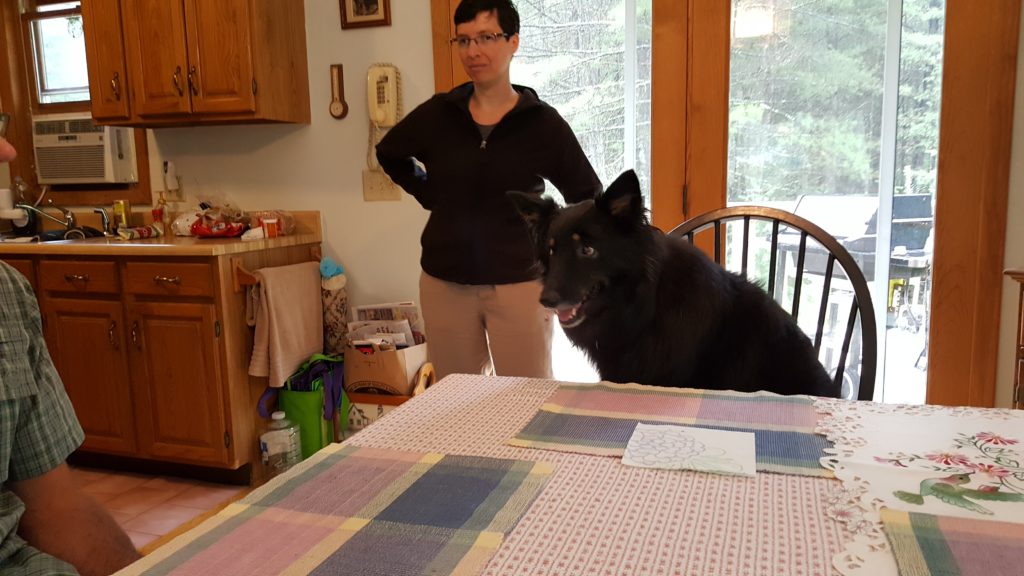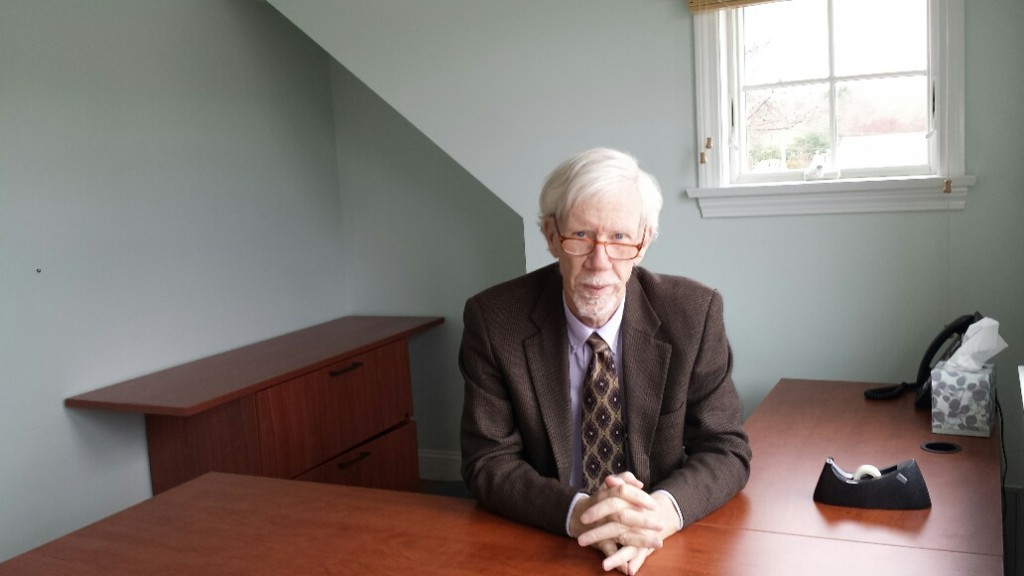Welcome to the Wakefield Doctrine (the theory of clarks, scotts and rogers)

‘A street sign taken to heart. Car and canine pause, the world waits.’
(Landscape Orientation)
A photo of Una ‘riding shotgun’ as we begin our walk.
Una is in close profile, the left side of her face illuminated from the sunlight coming through the car’s windshield that makes up the entire left half (from top to bottom) of the photo.
In the center top of the windshield (or, perhaps it would be better to say, ‘through the windshield ‘) there is a ‘Stop’ sign, every bit the municipal lollipop that you might imagine, were we all to end up in a good-natured Bosch painting (or perhaps an updated version of the animated movie, ‘Yellow Submarine’ (which, for the record, you couldn’t not love, at least not while claiming to still be young))
The Stop sign is all octagonal officialdom and the street that passes perpendicular to the street we are on is visible as a smooth, grey-blue patch against the winter browns of the hay in a field on the far side of the street. To the right of the ‘Stop’ sign there is a square stone column. Not quite a tower or battlement, it’s the kind of decorative structure that used to be popular at the entrance of residential developments. There would be a pair, one on each side of the street. Perhaps it gave the residents a feeling of security that, should the need arise, a tall gate might be closed, the two stone structures providing a secure anchor point. Or something. For all of the popularity of gates on a residential neighborhood, an actual gated community in this part of the country is more the exception than the rule. As well it should be, what can keep strangers out serves just as well to keep people in. A prison is that which separates some from the others. The relative numbers determine the virtue.
Yes, Una is sitting in the front passenger seat and we can see her face for a change. As luck would have it, we are driving into the setting sun. The light provides the opportunity to see her face. The light causes her to rest (and protect) her eyes. They are nearly completely closed.
One can be forgiven for venturing, ‘A dog, do they ever completely close their eyes?’ And, (as) one, I might say, “a lot less frequently than you might think.” Even lying on the couch (or the bed or the floor) dreaming of slow-running rabbits, the activity in the eyes of a dog is surprisingly consistent.
Humor is a funny thing. (Remember in college, the discovery of new music and art was like that second step into the waves at the beach, the one that just preceded throwing yourself in to the water, knowing that the fun had to do with coping and not doing? In that case, the waves were there already and the fun was, (hopefully), to do what makes swimming in the ocean fun. Finding new music was, at that time, much the same… “hey! you gotta listen to this band, this song..wait wait this part coming up.” And you look at your friend with hope, as they get to the part you found so amazing and they’d get a look on your face that, in the alchemy of the friendships of the young, was a look of gratitude and brother/sisterhood as they discovered that you share one more thing in life.)
…yeah like that.
Stephen Wright
Woody Allen
(Sunday morning… 10:58 am) ‘Hey I was just watching this with Phyllis and saw something that I never noticed. Diane Keaton (and her character Annie Hall) are the epitome of clarklike females. I won’t go into a long discussion other than to say, “Watch the scene (1:09 turn up the volume) where her parents suggest that Dwayne drive them to the airport. Annie leaves the scene but you can still hear her talking…” This Doctrine is truly a wonderful thing.
Jim Gaffigan
One Two Three
arrts
Thanks especially to Val. In one of her recent posts did some excellent poetry which reminded me that poetry is not necessarily distantly inaccessible. Shout-out to Carin who can actually do a whole TToT in verse. (damn!)
this guy
Over the wintry
forest, winds howl in rage
with no leaves to blow.
(Soseki (1275-1351)
and maybe a painting or two.
oh man! A(nother) chance to illegally reproduce one of my favorite paintings!

Nighthawks is a 1942 oil on canvas painting by Edward Hopper that portrays people in a downtown diner late at night. (Wikipedia)
We better stop and take a count!
lets see… five plus Una and Phyllis minus the Sunday Supplement minus the Free Grat Item and minus SR 1.3 Holy Smoke!
6) Phyllis
7) Una
8) Sunday Supplement (check back tomorrow)
9) ‘Your Grat Here’ (anyone in a position of really wanting to participate but are not able to do a whole TTOT post…. you can borrow one of ours! No, serially, send it in and we’ll go right ahead and post it. We’re the Wakefield Doctrine where you can never be 100% of a lot of things. ya know?)
10) Secret Rule 1.3
We’re done!
Wait…. gotta shout out to Josie Two Shoes hey! Josie! thanks for puttin on the ‘hop this weekend.
So you know how I keep saying, ‘learn the basic characteristics of the three worldviews and then look at the people around you?’ And, of course, by ‘people around you’ I mean anywhere, including music videos. And by characteristics, I mean, ‘by their posture and attitude, actions and reactions, from which of the three realities (that of the Outsider, the Predator or the Herd Member) would they seem to be relating themselves to the world around them?’
I submit this video. Good song, great illustration of the three worldviews. In the three lead guitar players you will see a clark, a scott and a roger.
The roger and the scott might at first be a little tricky. The clark? lol









